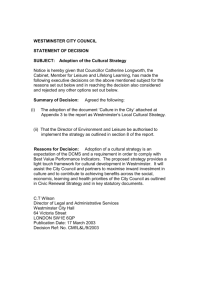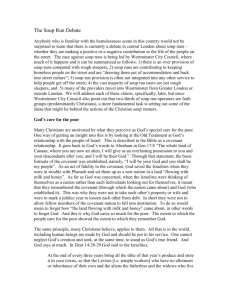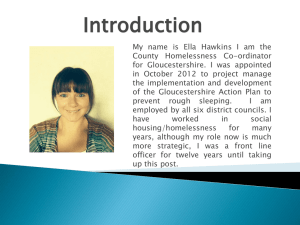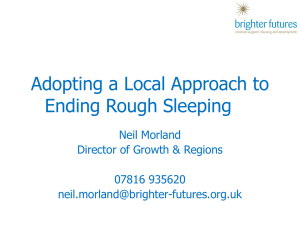1103 Westminster Soup Run consultation
advertisement
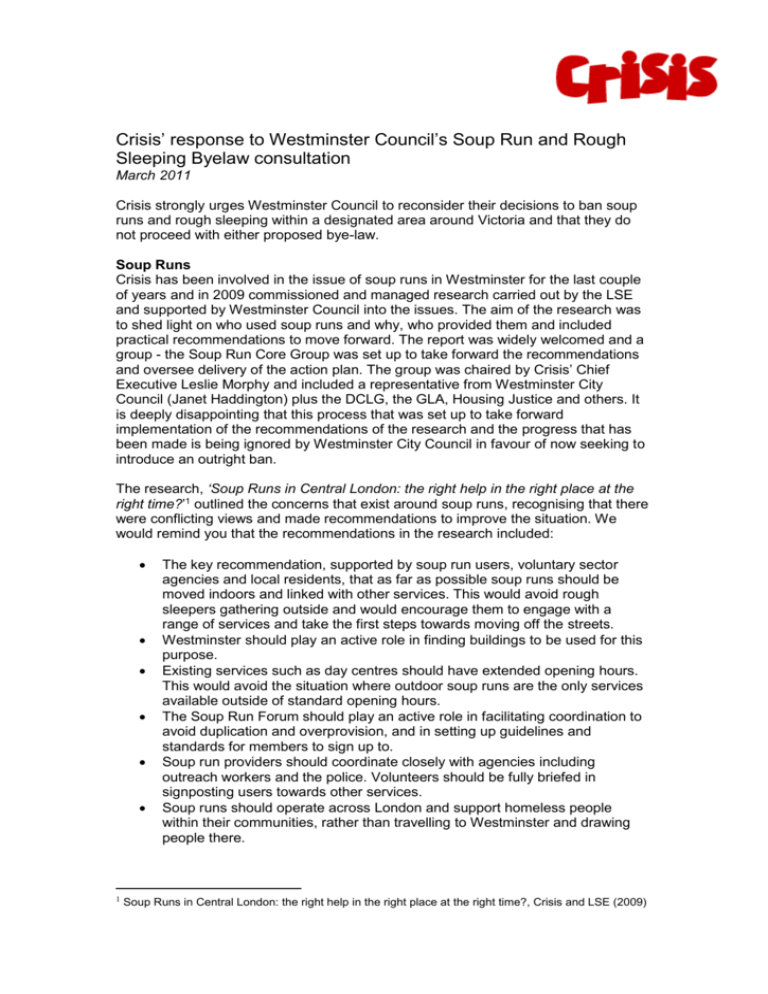
Crisis’ response to Westminster Council’s Soup Run and Rough Sleeping Byelaw consultation March 2011 Crisis strongly urges Westminster Council to reconsider their decisions to ban soup runs and rough sleeping within a designated area around Victoria and that they do not proceed with either proposed bye-law. Soup Runs Crisis has been involved in the issue of soup runs in Westminster for the last couple of years and in 2009 commissioned and managed research carried out by the LSE and supported by Westminster Council into the issues. The aim of the research was to shed light on who used soup runs and why, who provided them and included practical recommendations to move forward. The report was widely welcomed and a group - the Soup Run Core Group was set up to take forward the recommendations and oversee delivery of the action plan. The group was chaired by Crisis’ Chief Executive Leslie Morphy and included a representative from Westminster City Council (Janet Haddington) plus the DCLG, the GLA, Housing Justice and others. It is deeply disappointing that this process that was set up to take forward implementation of the recommendations of the research and the progress that has been made is being ignored by Westminster City Council in favour of now seeking to introduce an outright ban. The research, ‘Soup Runs in Central London: the right help in the right place at the right time?’1 outlined the concerns that exist around soup runs, recognising that there were conflicting views and made recommendations to improve the situation. We would remind you that the recommendations in the research included: 1 The key recommendation, supported by soup run users, voluntary sector agencies and local residents, that as far as possible soup runs should be moved indoors and linked with other services. This would avoid rough sleepers gathering outside and would encourage them to engage with a range of services and take the first steps towards moving off the streets. Westminster should play an active role in finding buildings to be used for this purpose. Existing services such as day centres should have extended opening hours. This would avoid the situation where outdoor soup runs are the only services available outside of standard opening hours. The Soup Run Forum should play an active role in facilitating coordination to avoid duplication and overprovision, and in setting up guidelines and standards for members to sign up to. Soup run providers should coordinate closely with agencies including outreach workers and the police. Volunteers should be fully briefed in signposting users towards other services. Soup runs should operate across London and support homeless people within their communities, rather than travelling to Westminster and drawing people there. Soup Runs in Central London: the right help in the right place at the right time?, Crisis and LSE (2009) There is a real problem with service provision for recent migrants who have no recourse to public funds. This should be urgently addressed by policy makers. People who are no longer sleeping rough must be properly supported in their accommodation so that they do not need to use soup runs. The progress that has been made in terms of implementing the recommendations and ensuring that soup runs reform - including becoming genuinely part of a continuum of provision to tackle homelessness, taking people from initial engagement through to getting access to the specialist services they need - had been slow, but movement is in the right direction. Real progress is now being made to encourage soup runs to operate indoors, in their home areas or by providing other alternatives. Extra impetus had been put behind this work with the recruitment of two new workers at the Passage. It therefore is both odd and concerning that the Council has chosen to unilaterally cut through this work just as it was beginning to bear fruit. In addition it should be noted that Westminster Council itself had not done all it could to support the work of the Soup Runs Core Group and the implementation of the report’s recommendations – in particular by actively helping make buildings available for soup runs to operate inside and by keeping residents informed of the progress in implementing the recommendations so that they could see that their concerns were recognised. Going ahead now with banning soup runs is likely to entrench the opinions of soup run providers who are resistant to change without providing any better solutions to help homeless people get and stay off the streets. In a free society, whatever one’s views of the merits of something, banning rarely helps change minds and actions; indeed it will only entrench views and set back progress. We strongly urge Westminster City Council to abandon their plans for this new bye law and return to working with others to implement the recommendations first set out in the LSE research and supporting the progress that was being made. Rough Sleeping Crisis is strongly opposed to the proposed ban on rough sleeping. We believe that it is particularly ill thought out and likely to be counter-productive. We do appreciate that Westminster residents and businesses experience problems with large numbers of people sleeping rough. It is also to be welcomed that the reasons the council uses to defend their proposals include a commitment to outreach work and an acknowledgement that, wherever possible, rough sleepers should be supported into hostels and other services. However, we simply do not see how making rough sleeping a criminal offence will contribute to the council’s aim of ‘reducing rough sleeping to as near zero as we can achieve.’2 We believe that the ban is ill-conceived for the following reasons: Moving rough sleepers out of the designated area with the threat of criminal charges will only result in them moving to another location, which could include moving out of sight and away from services. It will not help them to resolve their homelessness, nor will it be a constructive way to encourage them to engage with services. Imposing fines on rough sleepers which they have no possible way of paying is an ultimately pointless exercise, and giving extremely vulnerable people a criminal record could jeopardise their chances of recovery. 2 Soup Run and Rough Sleeping Byelaws FAQs, Westminster City Council (2011) It is likely to antagonise a range of voluntary and statutory bodies which deal with rough sleeping and will damage their relationships with Westminster Council. The police and the council already have extensive powers to deal with any criminal and anti-social behaviour by rough sleepers, so new legislation is unnecessary. We reject the notion that underpins this proposal and suggests that rough sleeping and particularly vulnerability is in some instance a “life style” choice - which needs enforcement action taken against it - rather than a situation which requires society and statutory and voluntary agencies to actively work together to engage the individuals involved as quickly as possible and then provide a holistic package of support for as long as is necessary to help them out of homelessness and back into society. We do not believe that criminalising the act of rough sleeping has any benefits at all for the individuals concerned, for the local community, for society at large or for any other statutory or voluntary agency working to tackle rough sleeping and help the individuals involved across the capital. As Crisis we therefore completely and utterly oppose this proposal. Conclusion Crisis believes that the plans to ban soup runs and rough sleeping within the borough of Westminster are ill thought out, will be counterproductive and will set back progress. Neither measure will contribute to the goal of ending homelessness. We sincerely hope that Westminster Council will respond to the views presented by respondents from various voluntary agencies and other stakeholders in the homelessness sector and rethink the proposals. We would like to continue working in partnership with Westminster Council to find constructive ways to improve soup run provision and end rough sleeping. However, if the council decides to take their proposals forward we will continue to oppose them clearly and publically and encourage our supporters to do the same. In addition to our concerns at the proposed bans themselves we are very concerned that Westminster Council is taking such important decisions independently of the London Delivery Board – the primary strategic vehicle for talking rough sleeping across the capital and on which Crisis, Westminster City Council and others from the voluntary and statutory sector sit. The Board has made great progress since its inception, particularly through the development of specific initiatives such as the 205 project and now No Second Night Out. However, the most recent CHAIN figures show an increase in the number of people seen sleeping rough.3 This, combined with the fact that the Borough of Westminster consistently contains well over half of all the rough sleepers in London, means that Westminster Council’s active participation in the work of the Board is absolutely essential. We do not believe that it is constructive for Westminster Council to take isolated action – including by going ahead with such a major initiative as this ban – without it being communicated to, considered by and agreed with the London Delivery Board. Westminster would also be well advised to consult and work more actively with other boroughs and with voluntary sector partners who have done much to tackle and reduce rough sleeping to see what lessons they can learn and to ensure we are working better together towards our shared goal of reducing and ultimately ending rough sleeping. 3 Street to Home Bulletin, 2009-10 Company Number: 4024938 | Charity Numbers: England and Wales 1082947, Scotland SC040094 For further information or briefings on issues related to homelessness, please contact: Katharine Sacks-Jones Policy Manager Crisis 66 Commercial Street London E1 6LT Tel: 020 7426 5668 Katharine.sacksjones@crisis.org.uk
